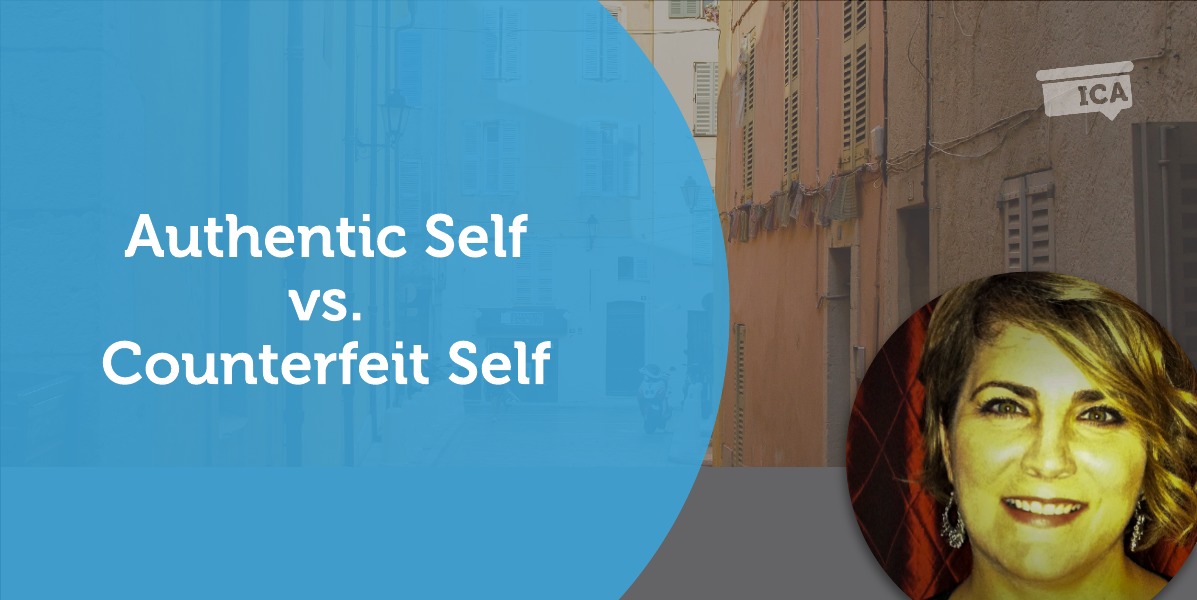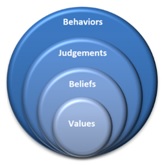
A Coaching Power Tool Created by Deborah Shipley
(Career Coach, UNITED STATES)
Exploring and being one’s authentic self can be a life’s journey, with both high mountain top experiences and low valleys. This struggle to be comfortable and confident with who one is and the kind of person they want to betakes courage, to truly accept one’s self, what they believe, value and to then let others see it … just as they are. As Brené Brown captures it:
To be authentic, we must cultivate the courage to be imperfect — and vulnerable. We have to believe that we are fundamentally worthy of love and acceptance, just as we are. I’ve learned that there is no better way to invite more grace, gratitude and joy into our lives than by mindfully practicing authenticity.
What does it mean to be Authentic?
It’s not…
Authenticity is about being present, living in the moment with confidence and staying true to oneself, our true north – that internal compass that guides us through life.
To live our lives authentically, helps us to be aware of our values and this way we can align our behaviour and actions to what is most important to us. Then our values help us navigate behaviour and choices. Making decisions in line with our values also helps us behave in a consistent manner, which helps others trust us.
Values are the things that are important to us. When our actions and decisions match our values – life is usually good. When they don’t align, it can be a source of unhappiness. This is why making a conscious effort to identify your values is so important. They are often beyond our conscious awareness.
This diagram shows that values are deep within us. They inform our beliefs. In turn, they shape our judgements and ultimately drive our behaviour. Our values are deep within us and our behaviours are what people see – it’s like the layers of an onion.
No one can be authentic by trying to be like someone else. You can learn from other’s experiences, but you cannot be successful in trying to be them. People trust you when you are genuine and authentic, not an imitation.
Being a Counterfeit
… an imitation intended to be passed off fraudulently or deceptively as genuine; not genuine; forged, pretended, unreal, a sham.
The cost of being a counterfeit is more than just monetary. It can be exhausting, depressing, an attack on our values and what is actually true! Ask Aspen. She experienced the cost because she couldn’t be someone she admired and aspired to be professionally. Why, because she was not herself. It’s hard to be authentic when trying to be someone else. We can learn from others, but we cannot be successful in being them because we are not them!
 Aspen didn’t recognize and appreciate her own talents, gifts and uniqueness. Willing to put on a mask every day that was not her own, good intention or not, because it didn’t fit the mask left scars and emptiness as deep as far as wide.
Aspen didn’t recognize and appreciate her own talents, gifts and uniqueness. Willing to put on a mask every day that was not her own, good intention or not, because it didn’t fit the mask left scars and emptiness as deep as far as wide.
Some of the costs of being fake, not being true to herself:
According to David Wolfe, expert human nutritionist, 10 additional signs of not being true or authentic to oneself:
- Judgment of others
- Look to others for approval
- Unhappiness
- Constantly doing things you dislike
- Life is largely controlled by someone else
- You don’t trust your decisions
- Too hard on yourself
- You hide emotions
- You feel the need to lie
- Not following your heart
So, at what point was enough? Unfortunately, when Aspen became bankrupt physically, socially, spiritually and professionally, all she could do was release. Her body and work situation around her made her, whether she wanted to or not it was no longer in her control. Aspen realized when she started to invest in herself, she slowly came out of bankruptcy and began to appreciate the person she was and meant to be, with all the talents, gifts and all the quirkiness within her. Her bankruptcy turned into positive dividends with interest. She realized her value.
How do I live my Authentic Self?
Becoming authentic is not always easy. First take some time to understand yourself, because the hardest person you will ever have to lead is yourself. Once you understand your authentic self, you will find that being with, leading or influencing others is much easier, including yourself. Try this:
Now list all the values you identify with. Select 7 that are most important to you in your life, as a guide on how to behave, or as components for a valued way of life. Don’t overthink it, go with your gut. Once done, for each value listed ask:
The power of thinking positivity is something to consider as well. Positive thinking anticipates happiness with expectations and belief of overcoming. Ask yourself,
For example, “I know all the facts and I am an expert in my field. My interview group needs to hear what I have to say and I have a great statistic to start the presentation to get their attention.”
Additionally, here are ten different ways to help connect with your authentic self from ‘10 Habits To Develop If You Want To Be Your Authentic Self’ by Power of Positivity:
- Write it Down: Jot down what you appreciate and love about yourself, along with what you may need to improve on. Write the names of people you want to spend your time with, and what you’re joyful and passionate about. Breathe this information in, meditate on it, and resolve to be this person. This is the authentic you.
- Learn to Feel Comfortable in Your Own Skin: Once you understand and accept your real self, get comfortable with it. Allow self-critical thoughts to naturally dissipate. Forget about comparing yourself to others, including what they may think.
- Let Go: Release any guilt or self-limiting thoughts. The past is the past – it’s over, done. Be in the moment, present, and at peace with your identity. This process may be gradual, and that’s okay. Breathe, be patient, and your real self will eventually surface.
- Ignore the Cynics: As you begin to make positive changes in your life, people will start to take notice. Most will look at you with admiration and respect – a few may not. Should you become aware of this cynicism, be mindful, and their pessimism, along with any discomfort you may feel, will inevitably disappear.
- Keep a Journal: Write downtimes and places when you felt your authenticity begin to wane – the actions and behaviours (yours and theirs), the situation, your observations, and the outcome. Keep this journal up to date – it will provide valuable insight into certain patterns of thoughts and behaviour you may wish to change.
- Pay Attention to Everyone: It’s too easy to become lazy and overlook other people – don’t make this mistake. Many people have a valuable lesson to teach if we’d only let them. Don’t underestimate the power of observation. Some of the best lessons may come without a word being uttered.
- Practice Active Listening: Giving your full attention to someone else is a remarkably powerful skill. Active listening is a sign of respect and of your true interest in others, which is a gift in itself. However, it also provides: (1) a stronger bond and level of trust with others, and (2) a fantastic opportunity to learn and grow from their knowledge and experiences.
- Be Kind: Being your authentic self and living up to your ideals means demonstrating kindness to everyone. Say hello, ask them how they’re doing, and make good eye contact while displaying a genuine smile.
- Accept Change: In order to be authentic, it also means being comfortable with change. Regardless of the circumstances, remain true to your inner core. Be open to self-improvement as well, as there is nothing more authentic than changing for the better.
- Align Your Heart and Path: You have one precious life to live. Spend it following your passions and your heart. Remember, the only expectations that truly matter are the ones that you set forth. Follow your real expectations by allowing you heart and life’s journey to walk step-in-step.
As you look to discover your authentic self, all that is left is to work on it and, most importantly of all, be authentic. Once you have figured out how to do this and started living it, you may be surprised at how much your life and your relationships improve.
References
www.Dictionary.com
True North, by Bill George/Peter Sims
Start with Why, by Simon Sinek
www.Integritycoaching.com
https://www.successconsciousness.com/index_000009.htm
